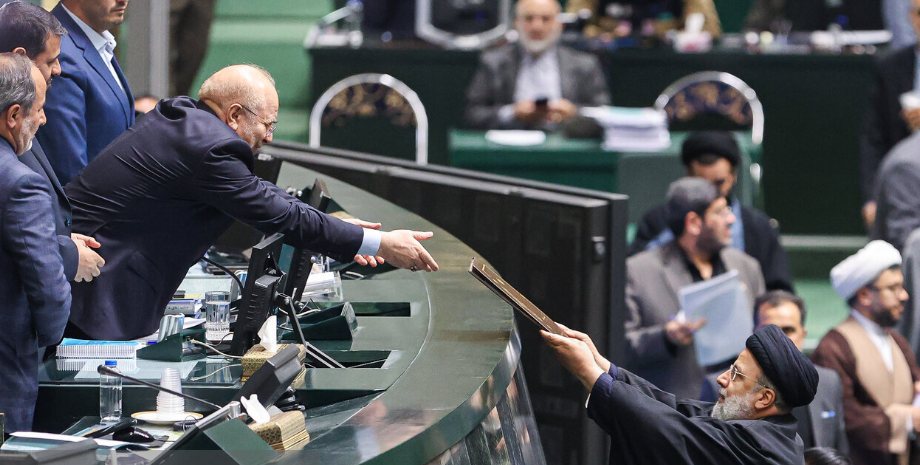February 2, 2024

The Majlis, in a very obvious rebuke to President Raisi, voted to reject his budget just two weeks after Raisi presented it to the Majlis.
The political nature of the rebuke was made clear days later when the Majlis voted to take up the same budget. The vote both times was on first reading, which is just a vote to take up a piece of legislation and refer it to committee. Such a vote is not on the substance of a bill, but the no vote the first time was an act of disrespect for Raisi since the Majlis has to take up a budget each year.
Deputies, however, said they voted no because the budget proposes only a 20 percent raise in pensions, which is less than half the current rate of inflation, and because the budget surprisingly recognizes a deficit. Budgets in Iran have routinely always been balanced even though everyone knows the government has run deficits for years. But instead of lauding Raisi for honesty, the deputies reamed him for admitting the government would yet again run a deficit.
The vote simply underscored that Raisi has turned into the least respected president in the history of the Islamic Republic, with politicians of all political stripes viewing him as amateurish if not incompetent. Raisi’s career was entirely in the Judiciary before he was elected president three years ago.
The budget was rejected by 154 of the 222 deputies present and voting, a more than two-thirds majority and a solid whipping from a body comprised almost entirely of conservatives since the regime refused to let most Reformists run in the last elections.
The proposed budget is 18 percent higher than last year, which is far short of what’s needed to cover inflation, which is running just under 50 percent annually.
Tax revenues are projected to rise 50 percent. The government has already said it plans major new and higher taxes on the public. The daily Entekhab said the 10 percent lowest income tax rate would now be applied to incomes that until now have been exempt from taxes.
Worsening the plight of the poor, the budget for cash handouts will rise by 15 percent, only about one-third the rate of inflation.
Oil revenues assume sales of 1.35 million barrels a day, less than government officials have claimed as the level of exports in recent months, at a price of $71.65 per barrel. The OPEC price of a barrel has not been that low any time this year, but Iran can only sell its oil at a substantial discount, generally thought to average around $12 a barrel, so, in that sense, the estimate is not unreasonable.
The oil estimates for next year represent a drop of 10 percent in volume and 16 percent in price compared to the figures used to prepare the budget for the current year, suggesting that President Raisi doesn’t believe his oil minister who claims oil revenues are surging. Oil officials have claimed exports topping 1.5 million barrels a day in recent public statements or about 30 percent more than what most estimates say.
Despite the forecast drop in export volume and average price, the budget indicates a decrease in oil revenues of just 3 percent, which makes no sense unless the government raises the prices of domestic gasoline and diesel by a huge amount, which officials uniformly deny is in the plan and which almost everyone fears would result in riots in the streets.
The budget does not assume any revenue from Iranian assets abroad that the regime (and Republicans in the US) claim has been unfrozen by the US, totaling $16 billion so far. The US says Iran can only tap those funds to buy food and medical supplies and to cover Iraqi imports of Iranian electricity and gas.
The International Monetary Fund (IMF) has calculated that for Iran to avoid a budget deficit in the coming year (beginning at Now Ruz) oil prices would have to reach $317 a barrel for the entire next year.
In keeping with the standard budget mythology, Raisi said the budget assumes an annual growth in GDP of 8 percent. That same number is used every year even though it is a long time since the country has seen such a growth rate.
The official figures released for the 12 months ending September 22 show the economy is still very dependent on oil. The petroleum sector grew 25.6 percent, according to the official figures, while mining grew 1.7 percent, industry by 2.6 percent, construction by 2.9 percent, and services by 7.5 percent with agriculture shrinking by 3.2 percent. Meanwhile, gold retailers in several cities closed their shops and went on strike in opposition to a rumored tax on retail gold sales. The rumor was sparked by an order from the government that all gold transactions be recorded. Such record keeping is necessary before an item can be taxed. The gold merchants noted that the sales of other major goods were taxed shortly after the government required that records be kept on all their sales. The Tax Administration denied December 24 that there were any plans to tax gold sales.
